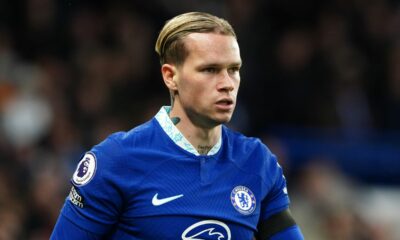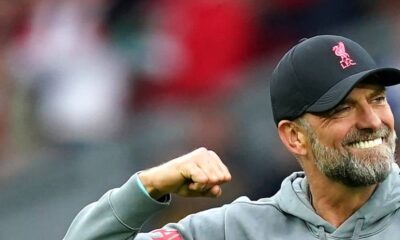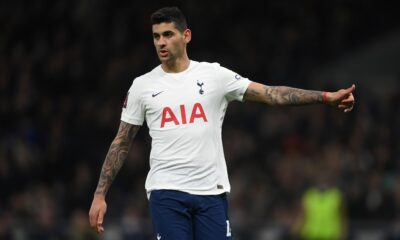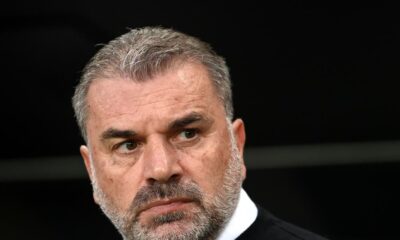Tottenham General News
Spurs’ Hall of Fame. Chapter two: the legendary Bill Nicholson

Written by Viorel Mesca
William Edward “Bill” Nicholson was born in Scarborough on January 26, 1919, as the second youngest of nine children. He attended Scarborough Boys High School, playing in the school team. He worked briefly as a laundry assistant after leaving school and played for the Young Liberals side in a local league. Recommended by his manager to one of Spurs’ scout based in York, he was invited for a trial by chief scout Ben Ives in a letter dated February 29, 1936.
The Tottenham Weekly Herald dated Friday, March 13 announced:
“On Trial. Spurs are giving a month trial to an amateur, Wm. E. Nicholson, an inside right of Scarborough Working Men’s Club. He recently celebrated his 17th birthday. His height is 5ft 8ins and weight 10st 12 lbs.”
After a month’s trial, he was taken on as a ground-staff boy earning £2 a week.
The Herald’s first mention of Bill playing for the club was in a 3-5 defeat of Tottenham’s A team at Guildford City on March 21. Bill scored a hat-trick on his second game for Spurs’ A team, in a 7-1 victory over Brentwood Mental Hospital on November 19, 1936. He also featured for Northfleet Amateurs during 1937. He made his debut for the London Combination reserve team in a 3-0 home win over Bournemouth & Boscombe Athletic on January 1, 1938 and was given a professional contract with the senior nursery club Northfleet United. On April 18, 1938 he gained a Kent Senior Cup winners medal in the final against Dover.
Bill signed professional forms for Spurs in August 1938 and added a further nine appearances prior to making his Football League debut in a 1-3 defeat by Blackburn Rovers on October 22.
During the war Bill served the Durham Light Infantry, rising to the rank of sergeant. He worked as an instructor in infantry training and physical education as well as playing plenty of Service football. Extended spells as a guest player at Newcastle United and Darlington were supplemented by briefer stints with Hartlepools United, Middlesbrough, Sunderland and Fulham. After the war he served the Central Mediterranean Forces HQ at Udine, Italy.
Although the war cost him much of his playing career, he had no regrets, as those experiences taught him the man-management skills which were to have such a great effect later in his career
By 1948 Bill had settled in to the right half berth and was a regular reserve for the England team. During December that year he scored the first of his six League goals – in 314 appearances for Spurs – against Fulham, a goal which was also the Club’s 2,000th in the Football League.
The 1949-50-51 campaigns saw Bill playing an important role for the team as Spurs lifted the Second and First Division championships in consecutive seasons. In 1950 he travelled to the Fifa World Cup as a member of the England squad. His only full cap was gained at Goodison Park against Portugal on May 19, 1951. Bill scored within the first 30 seconds of a 5-2 victory (some speak of 19 seconds). In all, he stood by as a reserve on 22 occasions.
Under invitation from the FA, Bill coached the varsity and Pegasus teams during the early Fifties. When his playing career ended in 1954 he switched to a coaching role and assisted with the England Under-23 team.
Shifting the emphasis away from the traditional high-tempo, long-ball game, Nicholson favored a more creative, short-passing style, building attacks through midfield.
Mention should be made that Bill assisted Walter Winterbottom, England’s manager, at the Fifa World Cup in 1958, inspiring a defensive strategy that blocked Brazil. The game ended goalless – the only time the eventual champions failed to score in that tournament.
Appointed assistant manager at Tottenham in 1955 he took over as manager on 11 October 1958 to enjoy a 16 year stint at the helm.
At the time, the club was sixth from the bottom of the First Division and there was little indication that the greatest period in the history of the club was about to begin. That afternoon, in the club’s first game under Nicholson’s management, Tottenham Hotspur beat Everton 10-4 at White Hart Lane.
The Double of 1961 saw him join the shortlist of men to have won the championship both as player and manager. Spurs dominated the opposition that year, winning their first eleven games and scoring 115 goals in 42 games.
The FA Cup was retained in 1962, and Spurs narrowly missed a place in the European Cup final, losing to Eusebio’s Benfica in the semifinal of the competition.
The 1962-1963 season will always be remembered by Spurs’ fans as their team became the first British club to win a major European trophy. In Rotterdam on 15 May, 1963, Spurs defeated favourites Atlético Madrid 5-1 to win the European Cup Winners Cup.
In 1967 Nicholson’s Spurs won their third FA Cup in seven years by beating Chelsea in the first-ever all-London final. This was followed by a string of trophies in the early 1970s – the League Cup was won in 1971 and 1973, and the UEFA Cup in 1972. The 1972 UEFA Cup Final was the final of the first ever UEFA Cup football tournament. It was a two-legged contest played on 3 May and 17 May 1972 between two English clubs, Wolverhampton Wanderers and Tottenham Hotspur.
Tottenham Hotspur won the tie 3–2 on aggregate. A 2–1 victory away from home in the first leg proved decisive for them, with Martin Chivers scoring a remarkable late winner, firing in an unstoppable shot from 25 yards. They then held Wolves to a 1–1 draw in the second leg to win the competition.
These feats brought many firsts: the first Double of the 20th century was followed by the first European trophy win by a British club; the first British team to win two different European competitions and the first to win the League Cup twice.
With a general change in attitudes in British football in the early 1970s, in particular negative tactics and player power, Nicholson resigned as manager of Spurs in September 1974, a few months after Spurs had lost the 1974 UEFA Cup final to Feyenoord. Bill Nicholson was reacting to what he considered were disturbing trends in football. He despised the onset of functional modern modes of play, was out of tune with the new, precocious breed of player, was sickened by widespread hooliganism.
It was said that he left Spurs with great dignity and respect from everyone at the club.
Following a spell on the scouting staff at West Ham United he returned to serve Spurs as a consultant and chief scout in July, 1976. His connection with Spurs’ scouting department continued until his retirement in July, 1997. In July, 1991 he was appointed Club President.
Amongst his personal honours, Bill received an O.B.E. in 1975, the PFA merit award in 1984 and in September, 1970 and other several awards. Macmillan published his autobiography “Glory, Glory, My Life With Spurs” in 1984. In December, 1998 he received the Freedom of the Borough from Haringey Council and the road leading to the Club from Tottenham High Road was renamed Bill Nicholson Way. The official unveiling of the newly named road took place in April, 1999 and is now incorporated into the club address.
A near sell out crowd numbering 35,877 delayed the kick-off for 10 minutes when Spurs organized a testimonial for Bill against AC Fiorentina on Wednesday, August 8, 2001. An emotion-charged evening saw Les Ferdinand, Gustavo Poyet and Steffen Iversen score Spurs goals in a 3-0 victory.
Bill became the first inductee into the Tottenham Hotspur Hall of Fame at a dinner held on March 11, 2004. The event was attended by 10 members of Spurs’ Double winning squad. He was similarly honoured a couple of months later by The National Football Museum based at Preston.
Growing up during the Depression, witnessing the horrors of the Second World War, he became so used to austerity that it was to remain integral to his way of life even when he was earning the wages of a top manager. While his star players would inhabit lavish homes in the north part of London, Nicholson didn’t move from a modest house close to Tottenham’s ground, mostly because of his utter dedication to his work and love for the club.
Summing up his philosophy, Nicholson said:
‘It is better to fail aiming high than to succeed aiming low. […] If you don’t have to drag yourself off the field exhausted after 90 minutes, you can’t claim to have done your best. [..] The public can’t be kidded. They know what they want to see, what is good and what is bad and what is just average. At least I believe they do.”
An impeccable judge of character and ability, he bought brilliantly, got the best out of players already at his disposal and will always be remembered as one of the greatest manager in the game.
In the end, I leave you dear readers with some of Bill’s quotes:
Naturally I’m a Tottenham man. So far as football is concerned, it means almost everything, doesn’t it really? Because I can reflect back to being a player with, and manager of some of the finest players that have ever been in the game. […] It’s been my life, Tottenham Hotspur, and I love the club.













